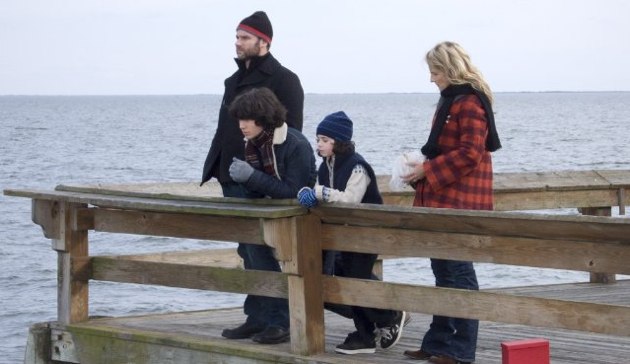Every Day's Liev Schreiber on Speedos, Fatherhood and the Hollywood-Broadway Divide
Does the cachet you get from doing Hollywood films allow you to take on more challenging material onstage? Where you become the selling point, so the script doesn't have to be a musical based on an old movie?
I think that was probably true earlier on in my career, where I wonder sometimes if I hadn't done Scream, would I have done Hamlet? [Laughs] But I think staying in New York and maintaining a fairly consistent presence in the theater and being fortunate enough to be part of some productions that were commercial successes in New York is more what drives my currency as a theater actor, I think.
They're separate industries, but there's no doubt that Hollywood has a box-office allure to a lot of New York theater-goers. I just get a little bent out of shape when I hear people complaining about Hollywood actors -- quote-unquote, even though I've never lived in Hollywood my entire life -- overrunning the theater and exploiting the New York theater, when in fact, many of those people they are calling Hollywood actors have been theater actors their whole lives but were fortunate enough to have movie careers and make substantial livings. And why wouldn't they want to return to their home and to a form of work that is completely different and rewarding in an entirely different way than film?
On the Social Network DVD, Jesse Eisenberg says that as an actor, he doesn't find film as fulfilling, because at the end of the day you've done two scenes or four scenes, whereas in the theater, you get to do the whole thing every night. Is that a big difference for you? Are you able to leave a day of shooting with a sense of completion or fulfillment?
Absolutely, I couldn't agree more: You fulfill a narrative arc every night on the stage. And I think also that film is a director's medium, it's really a director's and editor's medium, while in the theater, it's yours. While you're onstage, you own it. The structure, the shape, the tone belongs to the actor, and I think that's a satisfying feeling for a lot of actors.
Since this interview will be for the film's DVD release -- are you a home-theater person? Do you watch movies on DVD? Do you watch extras?
I do watch DVDs, and if the movie really grabs me, I'll watch the extras. But the movie has to really grab me.
I've spoken to other actors and directors who say they never watch the extras because they feel like they already know what goes on behind the scenes.
I don't watch the commentaries, only because I don't tend to watch movies more than once. But the times that I have listened to commentaries, they're really fascinating. I really do think they're interesting. And for real film buffs -- which I suppose I should be, but I guess I'm not -- I completely understand the appeal behind listening to the director and maybe one of the actors talking about the process they went through. There's just not enough time in the day.
Have you done any commentaries yourself?
No.
Really? Not even for Everything is Illuminated?
It was such a rush to get that DVD out, they were just pushing us like crazy.
For Every Day, because the character is a TV writer living in the rarefied atmosphere of show business, but the film is about the day-to-day struggles of family life, did you feel like you had to ground him? Given that he's in an unrelatable profession for a lot of the audience, did you have to play up his Everyman side?
I felt like [writer-director] Richard [Levine] really took care of that. I felt like he had done a very good job
of being sincere about his own life and drawing from that in a realistic way and balancing out the time spent at work with the time spent at home with the time spent internally in the relationship with Carla's character. I didn't think there was ever any risk of him coming off as rarefied because the themes of the film were so relatable, so clearly domestic in a way.
One thing I really liked was the fact that, not all that long ago, the gay son would have been treated as another wacky travail, whereas now it's really presented as the father being the one who has the problem in his inability to deal with things.
That was why it was so important to me to maintain Ned's homophobia -- that he really did take a hard line on that. It's not a very popular stance.
And usually that kind of kind of character in a movie is a full-blown, foaming-at-the-mouth Bible-thumper. So to see a guy who is otherwise very intelligent and very liberal...
Open-minded -- and to still have that thing when it comes down to your child. Like, "Holy sh*t!" I really liked that.
If his oldest child were a daughter, I imagine he'd be similarly protective as far as, Who are you talking to on the Internet? Who are you dating? When are you gonna be home?
That's a very good metaphor; I think that's how he felt about it.
So what's next for you?
I wish I had a better answer. [Laughs] I was on my way home to have some meetings and do a producer's reading of a play, and that's all up in the air now, so I'm not really sure. I spent the last three months in Southeast Asia watching the kids while Naomi worked, so I'm hungry to work again. Looking forward to something, just not sure what it is yet.
Pages: 1 2


Comments
Your idea of the phrase "had plenty to say" differs from mine.